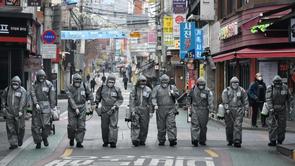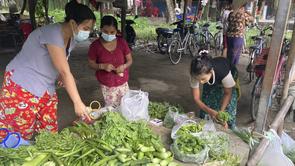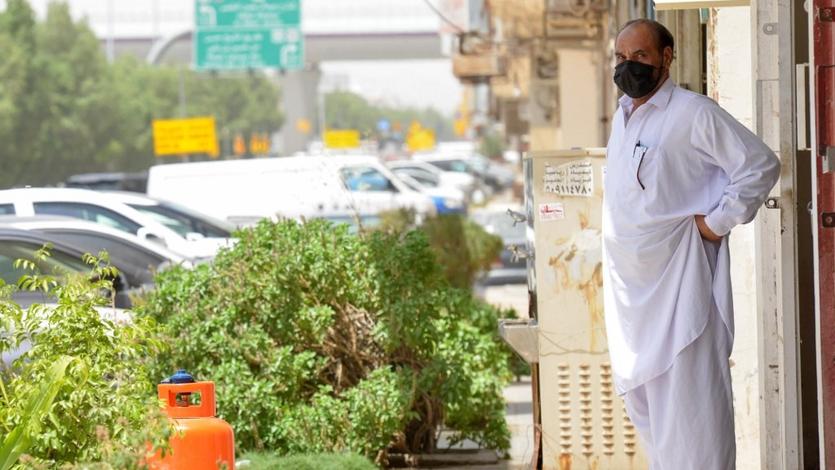 South Korean soldiers wearing protective gear spray disinfectant to help prevent the spread of the COVID-19 coronavirus, at a shopping district in Seoul on March 4, 2020. (JUNG YEON-JE / AFP)
South Korean soldiers wearing protective gear spray disinfectant to help prevent the spread of the COVID-19 coronavirus, at a shopping district in Seoul on March 4, 2020. (JUNG YEON-JE / AFP)
SEOUL / YANGON / RIYADH / SYDNEY / WELLINGTON - South Korea's prime minister on Friday said the country will lift its quarantine requirement for foreign arrivals without vaccination from June 8 and also start lifting aviation regulations imposed for international flights.
However, the government will maintain the requirement of a negative polymerase chain reaction test result prior to entry and a PCR test within 72 hours after arrival.
ALSO READ: COVID-19: Japan doubles cap to 20,000 overseas arrivals
"While there was a 7-day quarantine obligation for non-vaccinated foreign arrivals until now, such requirement will be eliminated from June 8 regardless of their vaccination status," Prime Minister Han Duck-soo told a pandemic response meeting, adding the country's COVID-19 situation had stabilized.
Han said any aviation regulations imposed at Incheon International Airport will be lifted from June 8 to ensure that flights can operate in a timely manner, as current restrictions on flights and flight operation times have caused inconveniences such as lack of tickets and rising prices.
Australia
Australian researchers believe millions of COVID-19 patients worldwide could be going undiagnosed for potentially fatal kidney disease.
Acute kidney injury occurs when that organ suddenly fails to filter waste from the blood, sometimes leading to debilitating sickness or even death. The condition is usually caused by complications from another serious illness.
University of Queensland doctoral candidate and kidney specialist Marina Wainstein said existing data indicated that about 20 percent of COVID-19 patients admitted to hospital developed AKI, rising to roughly 40 percent for those in intensive care.
Wainstein, discussing her findings which were published in the online journal PLOS Medicine and released to the public on Friday, said the AKI statistics could, unfortunately, be twice as large.
 Customers buy vegetables at a local morning bazaar, Oct 12, 2021, in Yangon, Myanmar. (PHOTO / AP)
Customers buy vegetables at a local morning bazaar, Oct 12, 2021, in Yangon, Myanmar. (PHOTO / AP)
Myanmar
Myanmar reopened primary, middle and high schools across the country for in-person classes for 2022-2023 academic year on Thursday, the education ministry's director-general U Kyaw Swar Thwin told Xinhua.
"Although the national school enrollment week for 2022-2023 academic year was from May 26 to June 1, the education ministry will continue accepting students," the official said.
"Schools in Yangon reopened in line with COVID-19 guidelines," an education official in Yangon told Xinhua.
In the capital city of Nay Pyi Taw, 842 schools including government-run primary, middle and high schools, monastic schools and private schools reopened on Thursday, state-run television channel MRTV announced.
According to the education ministry, more than 56.09 million students enrolled in the basic education schools across the country between May 26 and June 1.
New Zealand
New Zealand reported four cases of the COVID-19 Omicron subvariant BA.5 and one case of the subvariant BA.4 in the community on Friday.
The detection of the cases was all based on whole genome sequencing of tests. These are the first BA.4 and BA.5 cases reported in New Zealand community, with no clear link to the border, according to the Ministry of Health.
The ministry also reported seven cases of BA.2.12.1 in the community.
These Omicron subvariants are prevalent overseas and have been detected at the border for many weeks. "Their presence in the community is not unexpected and further cases are expected," said a ministry statement.
 A mask-clad laborer stands outside his workplace in the Saudi capital Riyadh on June 6, 2020, as lockdown measures are eased amid the COVID-19 pandemic. (PHOTO / AFP)
A mask-clad laborer stands outside his workplace in the Saudi capital Riyadh on June 6, 2020, as lockdown measures are eased amid the COVID-19 pandemic. (PHOTO / AFP)
Saudi Arabia
The Saudi General Authority of Civil Aviation has issued new rules for airlines transporting pilgrims during the upcoming Hajj season, the Saudi Press Agency reported on Thursday.
The rules cover all airlines working in the kingdom's airports, including private airlines, regarding the health requirements that should be met by passengers arriving in Saudi Arabia to perform Hajj.
According to the new rules, pilgrim passengers should be less than 65 years old, have completed immunization with basic doses of COVID-19 vaccines, and submit a negative PCR test for COVID-19 taken within 72 hours prior to departure to the kingdom.
Meanwhile, Saudi Arabian Airlines SAUDIA, the national flag carrier, announced on Thursday the allocation of 14 aircraft for pilgrims, which are expected to make 268 international flights from and to 15 stations worldwide, as well as 32 domestic flights.
In total, the airline will be responsible for providing around 107,000 international and 12,800 domestic seats during the Hajj Season, it added.
Saudi Arabia announced in April its plan to receive 1 million domestic and foreign pilgrims during the upcoming Hajj season, marking the first time that foreign pilgrims will be allowed to perform Hajj after the previous two seasons, which were restricted to domestic pilgrims due to COVID-19 outbreaks.
UAE
The United Arab Emirates has vaccinated all those who must be vaccinated against COVID-19 in the oil-rich Gulf Arab state, state news agency WAM reported on Thursday.
The UAE "announces that 100 percent of the targeted categories have been vaccinated," it said.


